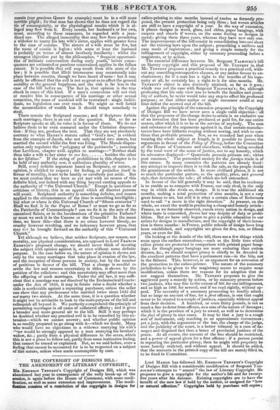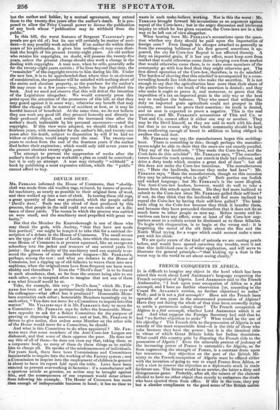Lord MAHON has followed MT. EMERSON TENSEST ' S Copyright of Designs
Bill with a considerable modification of Sergeant Tar.- NOURD'S attempts to 'amend" the law of Literary Copyright. He proposes to give a copyright for the author's life and for twenty- five years after his decease. Existing copyrights are to have the benefit of the new law if held by the author, or assigned for "love or natural affection." Copyrights held by purchase will expire ;
but the author and holder, by a mutual agreement, may extend them to the twenty-five years after the author's death. It is pro- posed to allow the Privy Council power to license the publication of any book whose "publication may be withheld from the public. In this bill, the worst features of Sergeant TALFODRD'S pro- posals are got rid of; but its use will certainly be matter of acci- dent—it may possibly work mischief. Han author die within three years of his publication, it gives him nothing—it may even dimi- nish the length of his present twenty-eight years. An old author who retains his copyrights, no doubt, will possess the twenty-five years, unless the present change should also work a change in the dealing with copyrights. A man now, when he sells, generally sells for the twenty-eight years certain ; if he lives beyond that time, the "remainder" of the copyright reverts to him during his life. Under the new law, it is to be apprehended than where time is an element of consideration, the purchaser will be satisfied with nothing short of the entire and absolute property, as the purchase for the author's life may cease in a few years—nay, before he has published the book. And we need not observe that this will defeat the intention of the Legislature altogether. We would earnestly press this point upon the attention of the promoters of this bill, so that they may guard against it in some way ; otherwise any benefit that may follow the change will be matter of accident at best, or it may be hurtful instead of beneficial. At the same time, we do not believe they can work any good till they proceed honestly and directly to their professed object, and render the increased time after the author's death inalienable by his personal successors—entail the copyright. If this view were adopted, we should think a fixed fourteen years, with remainder for the author's life, and twenty-one years after his death, subject to disposition by will if he had no widow or children, would amply meet the case. The twenty-one years to reckon from the end of the fourteen years if the author died before their expiration ; which would only add seven years to the present absolute twenty-eight years. The attempt to prevent the suppression of works after the author's death is perhaps as workable a plan as could be contrived ; but it is only an attempt. A man may virtually " withhold " a book by publishing a most expensive edition, which the " public " cannot afford to buy.



























 Previous page
Previous page